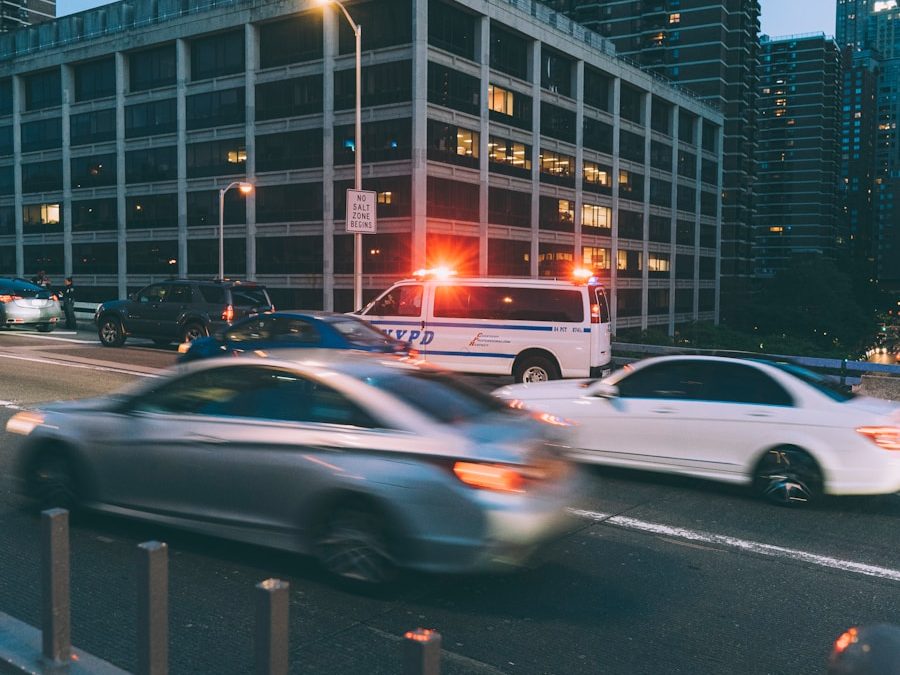Reporting minor accidents is a crucial aspect of responsible driving and maintaining safety on the roads. Even when the damage appears minimal, the implications of not reporting can be significant. For one, reporting an accident creates an official record that can be invaluable in the event of disputes or claims.
This documentation serves as a protective measure for all parties involved, ensuring that there is a clear account of what transpired. In many cases, individuals may underestimate the severity of an accident, only to discover later that injuries or damages were more extensive than initially thought. By reporting the incident, drivers can safeguard themselves against potential liabilities that may arise later.
Moreover, reporting minor accidents contributes to broader traffic safety initiatives. When accidents are documented, they provide data that can be analyzed to identify patterns and trends in road safety. This information can lead to improved traffic regulations, better road designs, and enhanced public awareness campaigns aimed at reducing accidents.
For instance, if a particular intersection is frequently the site of minor accidents, local authorities can investigate and implement changes to improve safety.
Key Takeaways
- Reporting minor accidents is important for documenting the incident and ensuring proper resolution.
- Legal requirements for reporting minor accidents vary by state and it’s important to be aware of the specific laws in your area.
- Not reporting a minor accident can lead to potential consequences such as legal penalties and difficulties with insurance claims.
- Before deciding not to report a minor accident, consider factors such as the extent of damage, injuries, and potential future complications.
- After a minor accident, take steps such as exchanging information with the other party, taking photos, and contacting your insurance company.
- Assess whether it’s safe to drive after a minor accident by checking for any visible damage, ensuring all parties are okay, and considering the condition of your vehicle.
- Insurance plays a crucial role in minor accidents by covering damages and providing assistance in the claims process.
- If handling a minor accident without a police report, be sure to gather all necessary information, document the incident, and notify your insurance company promptly.
Legal Requirements for Reporting Minor Accidents
The legal requirements for reporting minor accidents can vary significantly from one jurisdiction to another. In many places, drivers are mandated by law to report any accident that results in injury or property damage exceeding a certain monetary threshold. For example, in some states in the U.S., if the damage is estimated to be over $1,000, it must be reported to the police.
Failure to comply with these regulations can lead to penalties, including fines or points on one’s driving record. Understanding these legal obligations is essential for drivers to avoid potential legal repercussions. In addition to state laws, there may also be specific requirements set forth by insurance companies regarding the reporting of accidents.
Insurers often require policyholders to report any incident promptly to ensure coverage for claims related to damages or injuries. This requirement is not merely a formality; it helps insurers assess risk and manage claims effectively. Therefore, being aware of both legal and insurance-related obligations is critical for drivers involved in minor accidents.
Ignoring these requirements can complicate the claims process and may even result in denial of coverage.
Potential Consequences of Not Reporting a Minor Accident

Neglecting to report a minor accident can lead to a myriad of consequences that extend beyond immediate legal ramifications. One of the most significant risks is the potential for financial liability. If an injured party later decides to pursue compensation for medical expenses or damages, having no official record of the accident can weaken one’s defense.
Without documentation, it becomes challenging to establish the facts surrounding the incident, which could result in unfavorable outcomes in court or during negotiations with insurance companies. Additionally, failing to report an accident can have repercussions on one’s driving record and insurance premiums. Many insurance policies stipulate that all accidents must be reported, regardless of their severity.
If an insurer discovers that an accident was not reported, they may view this as a breach of contract, leading to increased premiums or even cancellation of the policy. Furthermore, if the accident involved another vehicle and the other party decides to file a claim later on, the lack of a police report could complicate matters significantly. This could result in prolonged disputes and additional stress for all parties involved.
Factors to Consider Before Deciding Not to Report
| Factors to Consider | Description |
|---|---|
| Severity of the Incident | The level of harm caused by the incident, including physical, emotional, or financial impact. |
| Legal Obligations | Understanding the legal requirements for reporting incidents in your jurisdiction or industry. |
| Organizational Policies | Reviewing company policies and procedures related to incident reporting and non-reporting. |
| Impact on Others | Evaluating how not reporting the incident may affect other individuals or stakeholders. |
| Risk of Reoccurrence | Assessing the likelihood of the incident happening again if not reported and addressed. |
Before deciding against reporting a minor accident, several factors should be carefully considered. First and foremost is the nature of the accident itself. Even if the damage seems minimal at first glance, it is essential to assess whether any injuries were sustained by any party involved.
Some injuries may not manifest immediately; for instance, whiplash or concussions can take hours or even days to present symptoms. Therefore, erring on the side of caution and reporting the incident can help ensure that any potential medical issues are addressed promptly. Another critical factor is the relationship between the parties involved in the accident.
However, this approach can be risky. Trust between drivers can quickly erode if one party later claims damages or injuries that were not initially disclosed.
Additionally, if there are witnesses present who may have differing accounts of the incident, having an official report can provide clarity and protect against conflicting narratives. Ultimately, weighing these factors carefully can help drivers make informed decisions about whether or not to report an accident.
Steps to Take After a Minor Accident
After experiencing a minor accident, there are several important steps that drivers should take to ensure their safety and protect their interests. The first step is to check for injuries among all parties involved. If anyone appears injured or if there is any doubt about their condition, calling emergency services should be the priority.
Even if injuries seem minor at first glance, it is always better to err on the side of caution and allow medical professionals to assess the situation. Once safety has been established and any necessary medical assistance has been called for, drivers should exchange information with each other. This includes names, contact information, insurance details, and vehicle registration numbers.
It is also advisable to document the scene by taking photographs of the vehicles involved, any visible damages, and relevant road conditions or signage. This visual evidence can be crucial when filing insurance claims or if disputes arise later on regarding fault or damages.
Tips for Assessing Whether It’s Safe to Drive After a Minor Accident

Determining whether it is safe to drive after a minor accident requires careful evaluation of both physical and mechanical conditions. First and foremost, drivers should assess their own physical state. If they are feeling disoriented, dizzy, or in pain following the accident, it is imperative not to attempt driving until they have been evaluated by medical professionals.
Even minor injuries can impair judgment and reaction times, making it unsafe to operate a vehicle. In addition to personal health considerations, drivers should inspect their vehicles for any visible signs of damage that could affect drivability. This includes checking for issues such as leaking fluids, broken lights, or compromised tires.
If any significant damage is observed that could impair safe operation—such as a flat tire or malfunctioning brakes—drivers should refrain from driving until repairs have been made or roadside assistance has arrived. In situations where it is unclear whether it is safe to drive, calling for a tow truck may be the best course of action.
The Role of Insurance in Minor Accidents
Insurance plays a pivotal role in managing the aftermath of minor accidents. Most drivers carry auto insurance policies that provide coverage for damages resulting from accidents, whether they are at fault or not. When an accident occurs, it is essential for drivers to notify their insurance companies as soon as possible.
This prompt communication allows insurers to begin processing claims and assessing damages efficiently. Insurance companies typically require specific information when filing a claim related to an accident. This includes details about the incident itself—such as time, location, and circumstances—as well as documentation like photographs and witness statements if available.
Depending on the policy terms and conditions, coverage may extend to vehicle repairs, medical expenses for injuries sustained in the accident, and even liability coverage if another party was involved. Understanding how insurance works in these situations can alleviate some stress and confusion during what can be a challenging time.
How to Handle a Minor Accident Without a Police Report
Handling a minor accident without a police report requires careful navigation of various steps to ensure that all parties are protected and that necessary information is exchanged effectively. First and foremost, it is essential for drivers involved in the accident to remain calm and composed while exchanging information with each other. This includes names, contact details, insurance information, and vehicle identification numbers.
In lieu of a police report, documenting the scene becomes even more critical. Drivers should take photographs from multiple angles that capture both vehicles involved as well as any relevant road conditions or signage that may have contributed to the accident. Additionally, gathering witness statements—if there are any bystanders—can provide further corroboration of events as they unfolded.
Once all necessary information has been collected and documented, both parties should consider contacting their respective insurance companies promptly to report the incident. While a police report may not be available in this scenario, insurers often have procedures in place for handling claims based on mutual agreements between parties involved in minor accidents. By following these steps diligently and maintaining open communication with insurers, drivers can navigate the aftermath of a minor accident without a police report effectively while protecting their interests.
If you are wondering whether it is safe to drive after a minor accident without a police report, you may also be interested in reading an article on auto insurance from Fair Shot Financial. This article provides valuable information on the importance of having the right coverage in place to protect yourself in the event of an accident. To learn more about auto insurance and how it can help you in situations like these, check out Fair Shot Financial’s article on auto insurance.
FAQs
What is considered a minor accident?
A minor accident is typically one in which there are no serious injuries and minimal damage to the vehicles involved. This can include fender benders, minor rear-end collisions, and other low-impact incidents.
Is it safe to drive after a minor accident without a police report?
In many cases, it is safe to drive after a minor accident without a police report, especially if there are no injuries and the vehicles are still operable. However, it is important to exchange contact and insurance information with the other driver and document the incident with photos if possible.
When should I involve the police after a minor accident?
You should involve the police after a minor accident if there are any injuries, if the other driver is uncooperative or aggressive, if there is significant damage to the vehicles, or if you suspect the other driver may be under the influence of drugs or alcohol.
What are the potential consequences of not filing a police report after a minor accident?
The potential consequences of not filing a police report after a minor accident can include difficulties with insurance claims, disputes over fault and liability, and challenges in proving the details of the accident in the future. It is generally recommended to file a police report to protect yourself in case of any future complications.


